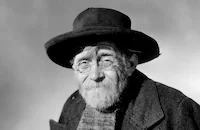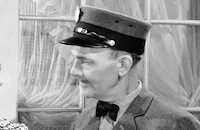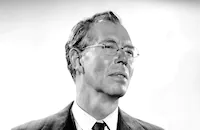Something for the Birds
Brief Synopsis
Cast & Crew
Robert Wise
Victor Mature
Patricia Neal
Edmund Gwenn
Larry Keating
Gladys Hurlbut
Film Details
Technical Specs

Synopsis
In Washington, D.C., elderly engraver Johnnie Adams has been surreptitiously "borrowing" invitations to swanky parties for thirty years. Johnnie, who is believed by his society acquaintances to be a retired Navy admiral, has a cynical yet good-natured admiration for the political manuevering in D.C., and is good friends with high-powered lobbyist and lawyer Stephen Bennett. At a party hosted by society matron Della Rice, Johnnie meets ornithologist Anne Richards, who has come from California to petition Congress not to pass a bill allowing drilling for natural gas in a sanctuary harboring the last sixty California condors. Steve is taken with the lovely Anne, although she makes clear her suspicion of lobbyists. When Anne asks Johnnie to arrange an appointment for her with the Secretary of the Interior, he demurs, stating that he does not like to trade on friendships to obtain favors. Angered by what she assumes is Johnnie's callousness, Anne storms out, and the next day, the tender-hearted Johnnie takes her to see Steve in the hope that he can help. Steve is delighted to see Anne, but appalled to learn that his firm is representing Continental Gas, the company sponsoring the bill to drill in the sanctuary. Steve keeps his firm's involvement secret from Anne and Johnnie, and takes Anne out to lunch and to the Smithsonian. Although Anne is aware of Steve's romantic interest, she is single-minded in her determination to save the condor, the rarest bird in North America. The next day, Anne learns from a radio broadcast by political commentator Roy Patterson that Steve represents Continental. While Anne looks for Johnnie, whose address is not listed in Naval records, Steve is also searching for him in order to deliver a refrigerator that Johnnie had jokingly requested for his landlady, Mrs. Chadwick. That evening, when Johnnie and Steve arrive at Anne's hotel to escort her to a party, Anne accuses Steve of double-crossing her by not revealing his association with the gas company. Anne warns Johnnie that Steve will eventually compromise him, and the next morning, Johnnie is taken aback when Steve's refrigerator is delivered to his home. Although Johnnie is reluctant to accept a gift from a lobbyist, Mrs. Chadwick's happiness upon seeing the appliance prohibits him from returning it. While a Senate committee investigating lobbyists begins an inquiry into Steve's procuration of not only Johnnie's refrigerator but eleven others, Johnnie goes to work and is inspired by his immigrant friend, Leo Fischer, to help Anne continue her fight to be heard. Telling Anne that she cannot fight with a peashooter when the enemy is using 16-inch guns, Johnnie uses his inside knowledge to influence various Congressmen to vote against the bill. Through their hard work, Anne and Johnnie soon have almost sixty votes lined up, but need to obtain many more in the remaining week before the vote. Johnnie and Anne bump into Steve at a soiree, and Steve, who has been quietly working behind the scenes to help Anne, advises her to rally public support for her cause. Just then, a process server gives Steve a subpoena to appear before the Senate committee, and Steve steers the server away from Johnnie, who has been identified as a recipient of one of the suspect refrigerators. The next morning, Steve tries to persuade Mr. Taylor, a Continental representative, to use a pipeline to obtain the natural gas and thereby preserve the bird sanctuary. Taylor refuses, however, and petulantly orders Steve to bribe Johnnie to drop his campaign. Steve storms out, and later, informs Johnnie that he has discovered the truth about his identity. Steve assures Johnnie that he still holds him in high regard, but warns him that for his own protection, he should stop his campaign against the bill. Reluctant to expose his subterfuge, Johnnie then tells Anne that he can no longer help her. Anne assumes that Steve has threatened Johnnie, and urges him not to give up. The couple then watch as Leo is sworn in as a U.S. citizen, and the judge's admonitions about the responsibilities of citizenship prompt Johnnie to fight again. Meanwhile, Steve asks Patterson not to reveal Johnnie's identity on his radio show, but Patterson does so anyway. Johnnie is then fired, and when Anne questions him, he admits that his elevated social standing was fraudulently obtained. Knowing that his former "friends" will now vote in favor of the bill, Johnnie apologizes to Anne, and she resigns herself to defeat. As Johnnie is seeing Anne off at the train station, however, they hear a radio broadcast of Steve's testimony before the Senate committee. Steve asserts that as a registered lobbyist, his activities are legal, and urges the committee to investigate Johnnie and Anne, whom he claims are covert lobbyists. Johnnie and Anne are infuriated by Steve's trick, but his strategy benefits them when they are called before the committee and Anne is able to plead for the condors. Johnnie also reveals that the Navy Cross he wears, which led to the initial confusion over his being an admiral, was posthumously awarded to his late son, and his candor and humor win over the huge audience. Steve then continues to encourage public support for Anne, and soon after, the pressure causes Continental Gas to withdraw its request for drilling rights. Anne and Johnnie are ecstatic, but while they are celebrating, Patterson reveals that their victory is largely due to Steve's machinations. Realizing how much Steve means to her, Anne decides to employ his advice about public support to her own ends, and sends out invitations to their wedding. When a bewildered Steve arrives at the stationer's to protest, he finds that Johnnie has been re-hired and given a promotion. Steve then questions Anne, and as she teases him into admitting that he does want to marry her, Johnnie pockets one of the invitations.

Director

Robert Wise
Cast

Victor Mature

Patricia Neal

Edmund Gwenn

Larry Keating

Gladys Hurlbut
Hugh Sanders

Christian Rub
Wilton Graff
Archer Macdonald
Richard Garrick

Ian Wolfe
Russell Gaige
Louise Lorimer
John Brown
Camillo Guercio
Joan Miller
Madge Blake
Norman Field
Gordon Nelson

Emmett Vogan
John Ayres
Charles Watts
Rodney Bell
Norma Varden
Leo Curley
John Maxwell
Elizabeth Flournoy
Mary Alan Hokanson
Charles Garrett
Gene Foley
Dolly Jarvis
Adele Longmire
Herbert Lytton
Morgan Brown

Parley Baer
Tom Mcdonough
David Mcmahon
Fred Datig Jr.
Harry Hines
Bob Milton
Richard Shackleton
Paul Power
Abe Dinovitch
Larry Arnold
Olga Borget
Holgar Bendixen
Angela De Witt
Curt Furberg
Andrew Roud
Greta Ullman
Marshall Bradford
Ralph Gamble
Robert Livingston
Ken Christy
James Craven
Roy Engel
John Diggs
Maj. Philip J. Kieffer
Michael Mchale
Edmund Cobb
John Alban
Tom Gibson
Ted Jordan
Charles Conrad
Dayton Lummis
Maude Prickett
Joan Shawlee

John Butler
Vince Townsend
Charles Wagenheim

Walter Baldwin
John Hedloe
Ralph Montgomery
Crew
Peter Ernest Backmann
I. A. L. Diamond
Samuel G. Engel
A. F. Erickson
Hugh S. Fowler
Boris Ingster
Boris Ingster
Elois Jenssen
Alvin M. Josephy
Anthony Jowitt
Sol Kaplan
Ray Kellogg
Arthur L. Kirbach
Joseph La Shelle
Charles Lemaire
Harry M. Leonard
Thomas Little
Bruce Macdonald
Bernard Mayers
Lionel Newman
Ben Nye
George Patrick
Joseph Petracca
Gene Romer
Don Torpin
Henry Weinberger
Lyle Wheeler

Film Details
Technical Specs

Articles
Robert Wise (1914-2005)
Born on September 10, 1914 in Winchester, Ind., Wise was a child of the Depression who quit college to earn a living in the movie industry. He began as an assistant cutter at RKO, where he worked his way up to the position of film editor and earned an Oscar® nomination for his bravura work with Orson Welles on Citizen Kane. He also edited The Magnificent Ambersons (1942) for Welles, along with several other RKO films.
Wise became a director by default when RKO and producer Val Lewton assigned him to The Curse of the Cat People (1944) after Gunther von Fritsch failed to meet the film's production schedule. Wise turned the film into a first-rate psychological thriller, and enjoyed equal success with another Lewton horror film, The Body Snatcher (1945).
Critical praise also was showered upon Wise's Born to Kill (1947), a crime melodrama; and Blood on the Moon (1948), an unusual psychological Western starring Robert Mitchum. Even more highly regarded was The Set-Up (1949), a no-punches-pulled boxing drama that won the Critics' Prize at the Cannes Film Festival. Wise moved on from RKO in the early 1950s, directing one of the movies' classic alien invasion films, The Day the Earth Stood Still, for 20th Century Fox.
At MGM he directed Executive Suite (1954), a compelling all-star boardroom drama; Somebody Up There Likes Me, a film bio of boxer Rocky Graziano that established Paul Newman as a major star; and The Haunting (1963), a chilling haunted-hause melodrama. His films for United Artists include Run Silent, Run Deep (1958), a submarine drama with Clark Gable and Burt Lancaster; I Want to Live! (1958), a harrowing account of a convicted murderess on Death Row, with Susan Hayward in her Oscar-winning performance; and the crime caper Odds Against Tomorrow (1959).
Wise served as president of the Academy of Motion Picture Arts and Sciences and the Directors Guild of America. He was awarded the Academy's Irving G. Thalberg Memorial Award in 1966, and the Directors Guild's highest honor, the D.W. Griffith Award, in 1988. He remained active as a director through the 1970s. His final film, Rooftops (1989) was a musical with an urban setting that recalled West Side Story.
The films in TCM's salute to Robert Wise are Citizen Kane (1941), The Magnificent Ambersons (1942), The Curse of the Cat People (1944), The Body Snatcher (1945), Born to Kill (1947), Blood on the Moon (1948), The Set-Up (1949), Executive Suite (1954), Somebody Up There Likes Me (1956), Run Silent, Run Deep (1958), B>West Side Story (1959), Odds Against Tomorrow (1959) and The Haunting (1963).
by Roger Fristoe

Robert Wise (1914-2005)
Quotes
Trivia
Notes
The working title of this film was Old Sailors Never Die. A December 1, 1950 Hollywood Reporter news item noted that Allen Rivkin and Laura Kerr had been signed to write the screenplay for the picture, but the extent of their contribution to the completed picture, if any, has not been confirmed. According to a July 1951 Hollywood Reporter news item, Anne Baxter, Dana Andrews and Victor Moore were originally set as the film's stars. According to studio publicity, Gene Tunney, Jack Dempsey and Al Einstein appeared as extras in the congressional hearing sequences, but their appearance in the released picture has not been confirmed.
Hollywood Reporter news items include the following actors in the cast, but their appearance in the completed film has also not been confirmed: Don Kohler, William Grath, Phil Chambers, Mary Adams, Helen Brown, Tim Graham, Frank Hanley, Chris Olsen, Mimi Gibson, Marie Sullivan, Bob Foulk, John Hyland, Joe Bush and Jo Gilbert. Although an Hollywood Reporter news item includes Sam McDaniels in the film, he does not appear in the released picture. Hollywood Reporter news items also note that some scenes were shot on location at Exposition Park and Los Angeles City College, CA. Backgrounds were shot in Washington, D.C. A modern source adds Major Sam Harris, General Sam Savitsky (Guests) and Jeffrey Sayre (Technician) to the cast. Something for the Birds was the first comedy directed by Robert Wise.

Miscellaneous Notes
Released in United States Fall September 1952
Released in United States Fall September 1952













